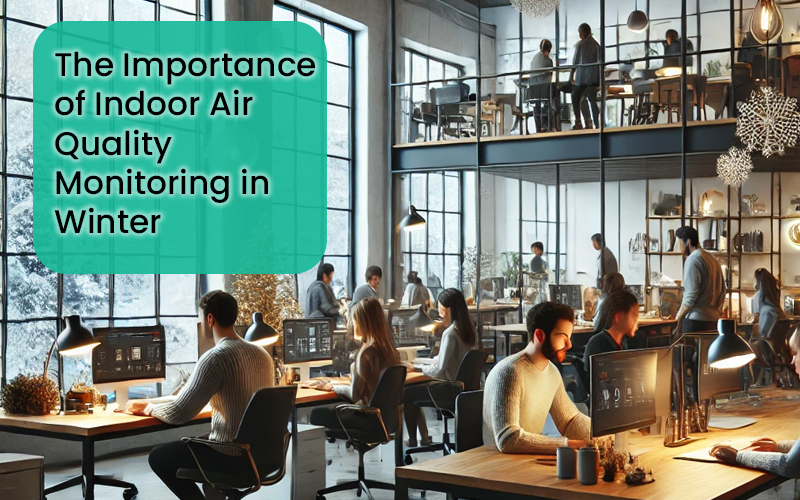The Importance of Indoor Air Quality Monitoring in Winter: Stay Healthy with HibouAir
Winter is a season of festivities, warm gatherings, and cozy nights. However, it is also a time when air pollution levels peak, both outdoors and indoors. For many, the colder months bring an increase in respiratory issues, allergies, and other health problems, all of which can be attributed to poor indoor air quality. Monitoring and maintaining clean air inside your home, office, or other indoor spaces is crucial to your health and comfort during the winter months.
Why Does Air Pollution Rise in Winter?
Several factors contribute to the spike in air pollution during winter:
Temperature Inversion: During winter, cooler air traps pollutants close to the ground, a phenomenon called temperature inversion. Unlike in warmer months, when warm air rises and disperses pollutants, the cold air creates a barrier, holding pollution closer to the earth’s surface. This effect leads to an increase in particulate matter (PM) and gases such as carbon dioxide (CO₂) and volatile organic compounds (VOCs), especially in urban areas.
Increased Use of Heating Systems: Indoor heating systems, such as furnaces, wood stoves, and space heaters, emit particulates and gases like CO₂, which can accumulate indoors. Studies show that wood-burning stoves, in particular, can significantly raise the levels of PM2.5 inside homes. The Environmental Protection Agency (EPA) highlights this as a major concern during the winter months.
Reduced Ventilation: In colder months, windows and doors remain closed to keep out the chill. While this conserves heat, it also traps indoor pollutants like CO₂, VOCs, and allergens inside, leading to stale and polluted indoor air.
Burning of Fossil Fuels: The burning of fossil fuels for heating and increased vehicle use during winter also contribute to outdoor pollution, which can seep indoors.
Why Indoor Air Quality Monitoring Matters in Winter
Indoor air quality monitoring is essential in winter due to the unique challenges posed by the season. As we spend more time indoors with limited ventilation, pollutants such as carbon dioxide (CO₂), particulate matter (PM), volatile organic compounds (VOCs), and allergens accumulate, impacting our health and well-being.
Higher CO₂ levels in poorly ventilated spaces can cause fatigue, headaches, and reduced productivity. Particulate matter, often generated by heating systems and cooking, penetrates deep into the lungs, increasing the risk of respiratory and cardiovascular issues. Low humidity during winter further irritates the skin, eyes, and respiratory system, making it harder to combat infections. VOCs from everyday items like cleaning agents and furniture add to the problem, creating an unhealthy environment.
Monitoring indoor air quality provides real-time data, helping you identify these issues before they become severe. Devices like HibouAir empower you to track pollutants, prompt you to improve ventilation, and maintain a healthier environment. Whether at home, in the office, or in public spaces, air quality monitoring ensures safety, health, and comfort during winter.
What HibouAir Offers
HibouAir is a multi-sensor air quality monitoring solution designed to provide real-time data on key environmental parameters. It continuously measures CO₂, PM1.0, PM2.5, PM10, ambient pressure, temperature, relative humidity, ambient light, noise, and VOCs. This holistic monitoring ensures you are aware of all factors impacting indoor air quality.
Real-Time and Historical Data: HibouAir provides actionable insights through its real-time and historical data. This helps users make informed decisions, whether it’s opening a window for ventilation or adjusting a humidifier.
Versatility: HibouAir is suitable for use in homes, offices, educational institutes, healthcare facilities, and more. It provides accurate data across various settings, helps users to create safe environments.
User-Friendly Design: HibouAir is plug-and-play air quality monitoring solution. For those seeking advanced analytics and remote monitoring, the HibouAir Cloud Solutions offer tailored options to meet specific needs.
Tips for Improving Indoor Air Quality in Winter
Ventilate Regularly: Open windows periodically to allow fresh air circulation, even on colder days.
Use Air Purifiers: Install air purifiers to reduce particulates and allergens indoors.
Maintain Proper Humidity: Use humidifiers to maintain ideal humidity levels between 30-50%.
Avoid Harsh Chemicals: Opt for natural cleaning products to minimize VOC emissions.
Monitor with HibouAir: Stay informed with accurate, real-time data to maintain healthy indoor air.
Winter poses unique challenges to indoor air quality, but monitoring and proactive measures can mitigate its impact. With a reliable air quality monitoring device like HibouAir, you can ensure your indoor environment remains safe and healthy throughout the colder months.

